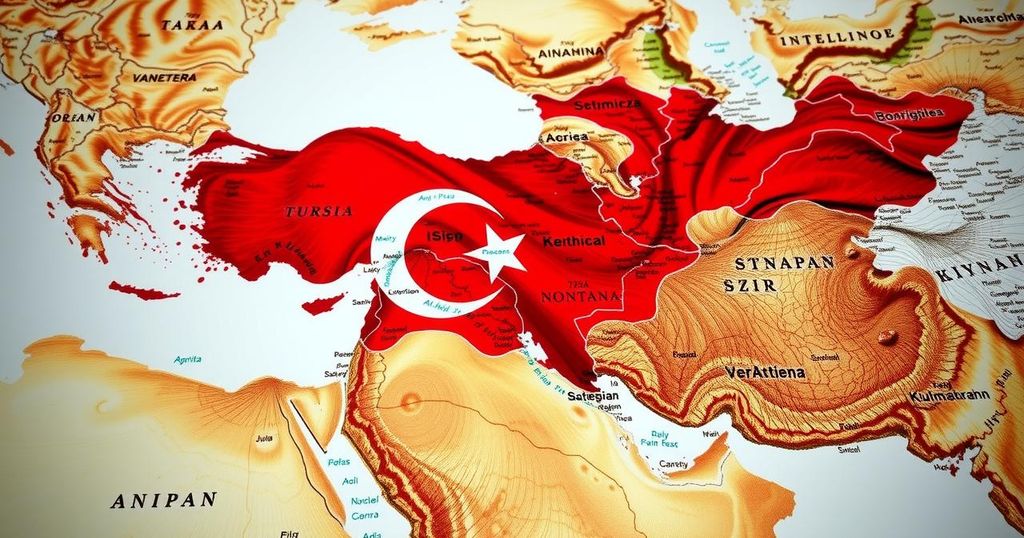The article outlines Turkey’s rise as a dominant power in the Middle East following the decline of Iran’s influence, particularly after the collapse of the Assad regime in Syria. It highlights Turkey’s strategic backing of Syrian rebels and its impact on regional dynamics, including Iraq and beyond, while contrasting its approach to Iran’s sectarian policies.
The geopolitical landscape of the Middle East is undergoing significant transformation, marked by Turkey’s rise as a dominant power following the decline of Iran’s influence through its long-standing interests in Syria. As the Assad regime crumbles, Turkey’s strategic support of Syrian rebels has elevated its status, allowing it to encapsulate a broader regional influence extending into adjacent territories such as Iraq and beyond. President Recep Tayyip Erdoğan’s unwavering backing of these opposition forces has ensured their resilience, facilitating a resurgence that contrasts sharply with the damage seen in prior conflicts.
While nations worldwide sporadically aided Syrian opposition early in the conflict, Turkey consistently provided stability through ceasefires and by enabling rebels to reorganize, thus reinforcing its political standing. In contrast, Iran’s backing of the Assad regime has weakened due to military distractions and resource constraints imposed by Israeli operations targeting its assets. Meanwhile, Russia’s focus on Ukraine has curtailed its support for Assad.
The outcomes of Turkey’s maneuvering are likely to resound in Iraq, particularly in Sunni-majority regions previously under Iranian influence. As Turkey enhances its ties with local Kurdish elements, it simultaneously aims to mitigate Iranian-backed Shia militia power. Additionally, Turkey’s outreach extends beyond its immediate neighborhood, illustrated by Erdoğan’s role in mediation efforts in Africa and Libya, emphasizing Ankara’s aspirations for influence across regions such as the Caucasus and Central Asia, further complicating traditional power paradigms, especially concerning Saudi Arabia and its relationships in the Middle East.
Turkey’s rise potentially redefines regional alignments, positioning it as a legitimate advocate for Sunni Muslims compared to Iran’s sectarian approach. Unlike the Shia narrative of Iran, which has relied on proxy groups to consolidate influence, Turkey’s engagement directly with local forces and issues offers an alternative perspective to governance and loyalty across the Sunni demographic.
As Iran’s grip loosens, marked by its failures in maintaining a cohesive power structure, Turkey’s position strengthens. The collapse of what was once referred to as Iran’s “Shia crescent,” which encompassed strategic territories from Tehran to Lebanon, demonstrates this shift. With its alliances rapidly dissolving, Hezbollah faces increasing pressure amidst both economic crises and military actions from Israel, solidifying Turkey’s status as a pivotal player in regional politics.
Ultimately, Turkey’s assertive foreign policy is not merely a reaction to Iranian decline but signifies its proactive strategy aimed at addressing security threats, number one being the Kurdish question, while fostering alliances through diplomatic engagement and economic ties. Countries observing this shift, including Saudi Arabia, the UAE, and Israel, are recalibrating their responses, aware that the future power dynamics in the Middle East will revolve around Turkey rather than Iran. This marks a significant transition from establishing the threats posed by Iran to grappling with the implications of Turkey’s burgeoning regional authority.
The article examines the shifting power dynamics in the Middle East, particularly focusing on Turkey’s ascendant influence following the decline of Iranian power due to the collapse of the Assad regime in Syria. Turkey, under the leadership of President Recep Tayyip Erdoğan, has positioned itself as a key regional player by actively supporting Syrian rebels, contrasting with the waning capabilities of Iran and its proxies. This analysis also reflects on how this shift redefines relationships and geopolitical strategies among regional states, particularly concerning Sunni and Shia alignments.
In conclusion, Turkey’s emergence as a pivotal power in the Middle East signals a transformative shift in the geopolitical landscape, supplanting Iran’s longstanding influence with its own growing authority. The ramifications of this evolution could potentially reshape alliances, destabilize existing power structures, and alter the parameters of regional diplomacy and security. As Turkey consolidates its standing, the future of Middle Eastern politics will increasingly depend on its strategies and decisions.
Original Source: www.theguardian.com







